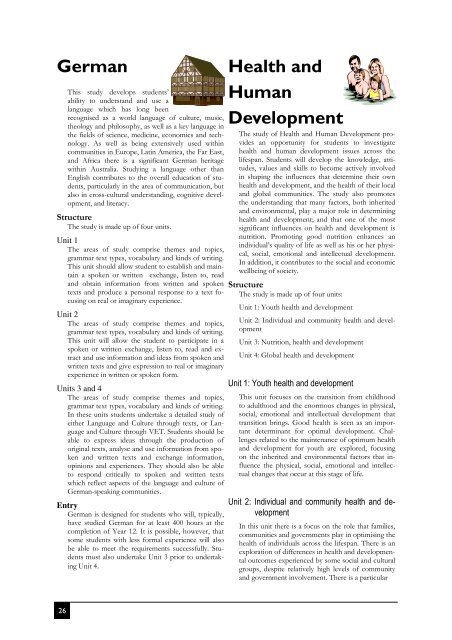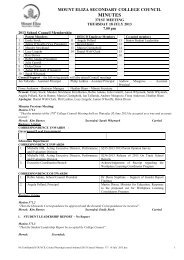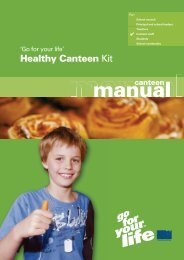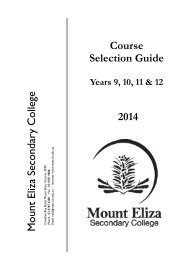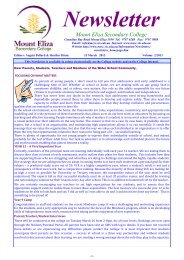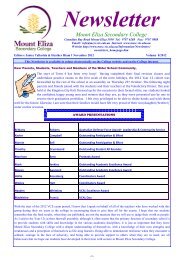senior school handbook 2008 - Mount Eliza Secondary College
senior school handbook 2008 - Mount Eliza Secondary College
senior school handbook 2008 - Mount Eliza Secondary College
You also want an ePaper? Increase the reach of your titles
YUMPU automatically turns print PDFs into web optimized ePapers that Google loves.
German<br />
This study develops students’<br />
ability to understand and use a<br />
language which has long been<br />
recognised as a world language of culture, music,<br />
theology and philosophy, as well as a key language in<br />
the fields of science, medicine, economics and technology.<br />
As well as being extensively used within<br />
communities in Europe, Latin America, the Far East,<br />
and Africa there is a significant German heritage<br />
within Australia. Studying a language other than<br />
English contributes to the overall education of students,<br />
particularly in the area of communication, but<br />
also in cross-cultural understanding, cognitive development,<br />
and literacy.<br />
Structure<br />
The study is made up of four units.<br />
Unit 1<br />
The areas of study comprise themes and topics,<br />
grammar text types, vocabulary and kinds of writing.<br />
This unit should allow student to establish and maintain<br />
a spoken or written exchange, listen to, read<br />
and obtain information from written and spoken<br />
texts and produce a personal response to a text focusing<br />
on real or imaginary experience.<br />
Unit 2<br />
The areas of study comprise themes and topics,<br />
grammar text types, vocabulary and kinds of writing.<br />
This unit will allow the student to participate in a<br />
spoken or written exchange, listen to, read and extract<br />
and use information and ideas from spoken and<br />
written texts and give expression to real or imaginary<br />
experience in written or spoken form.<br />
Units 3 and 4<br />
The areas of study comprise themes and topics,<br />
grammar text types, vocabulary and kinds of writing.<br />
In these units students undertake a detailed study of<br />
either Language and Culture through texts, or Language<br />
and Culture through VET. Students should be<br />
able to express ideas through the production of<br />
original texts, analyse and use information from spoken<br />
and written texts and exchange information,<br />
opinions and experiences. They should also be able<br />
to respond critically to spoken and written texts<br />
which reflect aspects of the language and culture of<br />
German-speaking communities.<br />
Entry<br />
German is designed for students who will, typically,<br />
have studied German for at least 400 hours at the<br />
completion of Year 12. It is possible, however, that<br />
some students with less formal experience will also<br />
be able to meet the requirements successfully. Students<br />
must also undertake Unit 3 prior to undertaking<br />
Unit 4.<br />
Health and<br />
Human<br />
Development<br />
The study of Health and Human Development provides<br />
an opportunity for students to investigate<br />
health and human development issues across the<br />
lifespan. Students will develop the knowledge, attitudes,<br />
values and skills to become actively involved<br />
in shaping the influences that determine their own<br />
health and development, and the health of their local<br />
and global communities. The study also promotes<br />
the understanding that many factors, both inherited<br />
and environmental, play a major role in determining<br />
health and development; and that one of the most<br />
significant influences on health and development is<br />
nutrition. Promoting good nutrition enhances an<br />
individual’s quality of life as well as his or her physical,<br />
social, emotional and intellectual development.<br />
In addition, it contributes to the social and economic<br />
wellbeing of society.<br />
Structure<br />
The study is made up of four units:<br />
Unit 1: Youth health and development<br />
Unit 2: Individual and community health and development<br />
Unit 3: Nutrition, health and development<br />
Unit 4: Global health and development<br />
Unit 1: Youth health and development<br />
This unit focuses on the transition from childhood<br />
to adulthood and the enormous changes in physical,<br />
social, emotional and intellectual development that<br />
transition brings. Good health is seen as an important<br />
determinant for optimal development. Challenges<br />
related to the maintenance of optimum health<br />
and development for youth are explored, focusing<br />
on the inherited and environmental factors that influence<br />
the physical, social, emotional and intellectual<br />
changes that occur at this stage of life.<br />
Unit 2: Individual and community health and development<br />
In this unit there is a focus on the role that families,<br />
communities and governments play in optimising the<br />
health of individuals across the lifespan. There is an<br />
exploration of differences in health and developmental<br />
outcomes experienced by some social and cultural<br />
groups, despite relatively high levels of community<br />
and government involvement. There is a particular<br />
26


